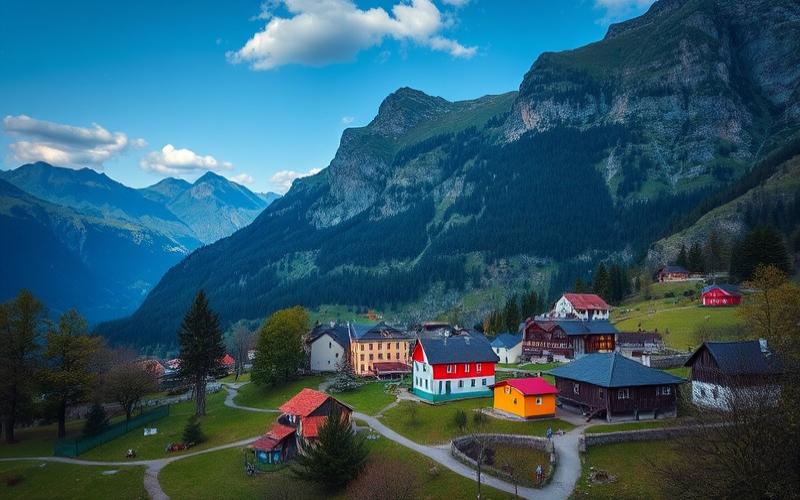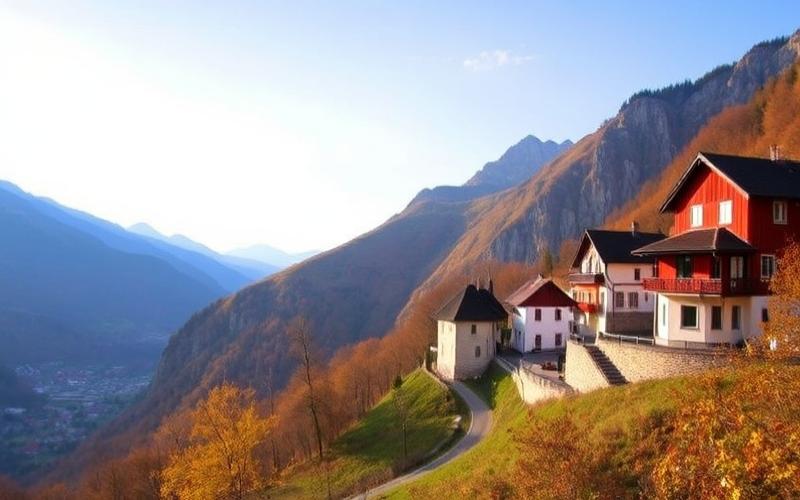
 Published on and written by Cyril Jarnias
Published on and written by Cyril Jarnias
Nestled Between Austria and Switzerland, the Tiny Yet Fascinating Liechtenstein
The tiny yet fascinating Liechtenstein offers a culinary richness often overlooked, blending tradition with modernity. For expatriates seeking authenticity and new taste experiences, this culinary guide offers a journey through local flavors, from robust meat stews to artisanal cheeses and typical sweet treats that will awaken your taste buds.
Explore local markets and discover how fresh Alpine products daily inspire the country’s cuisine. This culinary overview will quickly become essential for anyone wishing to immerse themselves in local culture and truly feel at home in this picturesque corner of Europe.
Good to Know:
Liechtenstein’s local markets are often held on weekends and feature fresh products directly from surrounding Alpine farms.
Must-Try Dishes of Liechtenstein Cuisine
Käsknöpfle, Liechtenstein’s national dish, is a pasta specialty made with milk or quark cheese, then baked with local mountain cheese and onions. This iconic dish is typically enjoyed with applesauce, making it both rich and comforting.
Another essential classic is Ribel (or Tüarka-Rebel), a rustic dish prepared from a mixture of cornmeal and sometimes wheat. Traditionally cooked in milk until creamy, it’s then lightly toasted to develop its flavor. Ribel is eaten for breakfast or as a snack, often served with sweet additions like jam or compote.
Here are some other local specialties:
- Hafalaab: thick soup with dumplings made from flour and semolina.
- Torkarebl: a cross between porridge and corn dumplings.
- Dishes using local products like artisanal honey from Alpine valleys or aged cheeses from mountain farms.
| Dish | Main Ingredients | Special Feature |
|---|---|---|
| Käsknöpfle | Homemade pasta, Alpine cheese | Baked with onions |
| Ribel | Corn/wheat semolina, milk | Often toasted then sweetened |
| Hafalaab | Broth, flour/semolina | Rustic dumplings |
| Torkarebl | Corn flour/semolina, milk | Served with jam/coffee |
Swiss culinary influence is evident in the abundant use of melted cheese (reminiscent of Swiss fondue), while the pasta resembles that consumed in Austria (spätzle). Germany has also left its mark through introduced baking techniques and some typical simple desserts.
Among the standout local products:
- Alpine cheese: central ingredient in many traditional dishes
- Artisanal honey: used both to accompany certain dishes and in pastries
Where to enjoy these specialties:
Recommended restaurants:
- Family-run inns in villages frequently offer homemade Käsknöpfle.
- Establishments in Vaduz or Balzers often feature a “traditional cuisine” menu including these iconic dishes.
Culinary events:
- During summer village festivals (“Dorffest”) and farmers’ markets (“Bauernmarkt”), it’s common to see ribel or käsknöpfle prepared right before you to showcase their authenticity to visitors.
Interesting Fact
In some Liechtenstein families, they say there are as many secret recipes for Käsknöpfle as there are Alpine pastures! Tradition even holds that each family has its own exclusive blend of local herbs added to the cheese during baking.
For the curious expatriate foodie eager to explore this unique culinary culture, sharing a meal around a large table remains one of the best ways to be welcomed as a local—because here more than elsewhere, “eating well” is above all about sharing.
Good to Know:
Liechtenstein, influenced by its neighbors Switzerland, Austria, and Germany, offers flavorful cuisine where traditional dishes like Käsknöpfle, these small artisanal pasta pieces enhanced with delicious mountain cheese, and Ribel, a rustic cornmeal preparation, serve as culinary stars. Local products such as honey and artisanal cheeses enrich local recipes, offering unique flavors. For an authentic experience, expatriates can discover these specialties at renowned establishments like Restaurant Torkel in Vaduz, or during events like the “Liechtensteiner Käsefestival.” An interesting tidbit for enthusiasts: did you know that the country holds an annual cooking competition where residents compete to make the best Ribel? This competition highlights the importance of gastronomy in Liechtenstein’s cultural heritage.
Exploring Traditional Markets and Iconic Restaurants
Traditional markets in Liechtenstein, particularly in Vaduz and Balzers, hold a central place in local life. In Vaduz, the Christmas market is renowned as one of Europe’s most beautiful, attracting residents and visitors annually with its colorful stalls, artisanal products, and unique festive atmosphere. This type of event illustrates the importance of markets as places for social gathering, cultural exchange, and tradition preservation. In Balzers, local events also maintain strong attachment to rural customs.
These markets feature a variety of typical products showcasing Liechtenstein’s terroir:
- Local cheeses (often made from Alpine milk)
- Artisanal charcuterie
- Smoked or dried meats
- Fresh agricultural products: new potatoes, root vegetables
- Mountain honeys
- Homemade jams
| Product | Origin / Special Feature |
|---|---|
| Alpine cheeses | Local milk |
| Dry sausages | Family recipes |
| Ribel corn | Ground corn for traditional dish |
| Honey | Black bees from the Rhine |
Among the iconic restaurants to discover in Liechtenstein are several historic or renowned establishments:
- In Schaan: some traditional restaurants stand out for their family history or menu focused on regional cuisine.
- In Eschen: a few inns still serve typical dishes in an authentic setting.
Must-try dishes at these locations:
- Käsknöpfle: small homemade pasta coated with a generous mixture of melted local cheeses and served with fried onions.
- Ribel: rustic preparation made from coarsely ground semolina (ribel corn), often accompanied by compotes or served as a side dish.
These dishes embody the Liechtenstein culinary soul—they’re frequently associated with family or village celebrations and large community gatherings.
Cultural Anecdotes:
The Vaduz winter market isn’t just about shopping; it’s also an opportunity for local families to celebrate St. Nicholas together over homemade mulled wine.
Some historic inns proudly display recipes passed down through generations—each chef adds their personal touch while meticulously preserving inherited know-how.
Practical Tips for Expatriates Wishing to Fully Enjoy Markets and Restaurants:
- Prefer an early morning visit to get the best selection at stalls.
- Participate in seasonal events (Christmas Market in Vaduz, village festivals) to fully experience local conviviality.
- Don’t hesitate to exchange a few words in local German during purchases; this facilitates cultural integration.
Quick List:
- Always try Käsknöpfle during your first local culinary experience
- Bring a reusable bag for market shopping
- Ask locals about the best days/times according to the season
To truly absorb Liechtenstein’s culinary heritage,
it’s advised not only to explore its markets,
but also to linger around a convivial table where
the ancestral flavors of the country still live today.
Good to Know:
In Liechtenstein, the traditional markets of Vaduz and Balzers play a central role in local life, offering typical products such as artisanal cheeses, selected meats, and fresh agricultural products, reflecting the country’s culinary authenticity. Expatriates discover in these places a condensed version of Liechtenstein culture, particularly during morning visits to avoid crowds. In Schaan and Eschen, iconic restaurants like Gasthaus zum Löwen serve traditional dishes like Käsknöpfle or Ribel, essential for understanding local gastronomy. Some of these restaurants, with histories dating back generations, offer a rich experience rooted in the country’s culinary history. For successful immersion, approaching merchants and restaurateurs for local recommendations helps with integration and enriches the culinary experience in Liechtenstein.
Dining Etiquette Tips for Expatriates
Punctuality
- Punctuality is essential in Liechtenstein, both professionally and privately.
- Arriving late to a meal is considered disrespectful to the host and other guests.
Host Gift
- It’s customary to bring a small gift when invited to dinner, such as flowers (avoid chrysanthemums which are associated with funerals), a bottle of wine, or chocolates.
- Present your gift upon arrival, accompanied by a thank you note.
Dress Code
| Occasion | Recommended Attire |
|---|---|
| Formal dinner | Elegant and understated clothing |
| Meal with friends | Casual but neat |
| Family gathering | Clean and modest |
- Avoid overly flashy or sloppy outfits. Sobriety and discretion are appreciated.
Meal Progression
- Wait for the host to invite you to the table and begin the meal before touching food.
- It’s not uncommon for a toast to be made before starting: follow along, look your neighbors in the eyes while clinking glasses, then say “Zum Wohl!”
- At the end of the meal, it’s appropriate to warmly thank the host for their hospitality. A simple phrase like “Danke für das Essen” (thank you for the meal) usually suffices.
General Table Behavior
Do:
- Maintain upright posture
- Place hands on the table (but not elbows)
- Use cutlery correctly: knife in right hand, fork in left
- Wait until everyone is served before starting
Don’t:
- Speak loudly or interrupt someone
- Serve yourself without offering to others first
- Use your cell phone during the meal
Respecting these rules demonstrates not only good manners but also a sincere willingness to integrate into Liechtenstein society.
Good to Know:
In Liechtenstein, punctuality is crucial during meals—it’s better to arrive a few minutes early than too late. When dining with family or friends, offering a small gift, often flowers or chocolate, is an appreciated tradition to show gratitude to the host. Regarding dress code, casual but neat attire is generally appropriate unless otherwise indicated. At the start of the meal, it’s common to raise your glass and say “Zum Wohl” for toasting, while at the end, thanking the host with “Danke für das Essen” is good form. It’s also important to familiarize yourself with the meal pace, often divided into several courses, and not to start eating until the host has begun or given the signal. Finally, avoid placing elbows on the table and use cutlery in the continental style to prevent cultural missteps.
Finding International Ingredients in Liechtenstein
Liechtenstein, though small in area, offers surprising diversity in access to international ingredients. This dynamism meets the needs of a cosmopolitan population and numerous expatriates wishing to cook according to their traditions while discovering local culture.
Specialty Grocery Stores
In main cities like Vaduz or Schaan, several specialty grocery stores offer food products from around the world. These shops are often run by families from different foreign communities and provide a wide selection of imported products:
- Mediterranean products (olive oil, Italian pasta, Greek cheeses)
- Asian ingredients (basmati rice, soy sauces, instant noodles)
- American and British specialties (peanut butter, breakfast cereals)
Opening hours generally range from 8:00 AM to 6:30 PM Monday through Saturday. Common addresses include:
| Grocery Name | Approximate Address | Main Specialties |
|---|---|---|
| Asia Market | Vaduz | Asian products |
| Mediterraneo | Schaan | Mediterranean products |
| International Food Store | Triesen | European/global ingredients |
For expatriates seeking to rediscover the taste of their home country or explore international cuisine without leaving Liechtenstein, these grocery stores constitute a true haven.
Local Markets
Weekly markets are held in main cities. They provide opportunities to discover not only fresh local products but also some stalls dedicated to international flavors:
- Vaduz Market:
- Where: Central square
- When: Saturday morning
- Specifics: Occasional vendors offering exotic spices or European specialties
These markets are often animated by a festive atmosphere reminiscent of major cultural events.
Online Shops
To complement the physical offering, several online stores deliver to Liechtenstein:
- Amazon.de / Amazon.fr
- Wide international selection
- Fast delivery within days
- Swiss specialty food shops
- Websites like farmy.ch or coop.ch/lebensmittel/internationale-kueche/
- Varied selection for Indian, Chinese, African cuisines…
- Websites like farmy.ch or coop.ch/lebensmittel/internationale-kueche/
Online purchasing particularly allows access to ingredients difficult to find locally and offers a convenient alternative for residents far from major cities.
Personal Importation
Many residents order directly from foreign suppliers or bring back certain ingredients themselves when traveling to neighboring countries (Switzerland and Austria). This practice is particularly common among expatriates wanting to obtain specific products from their home countries.
Cultural Events and Festivals
Liechtenstein regularly hosts multicultural festivals where gastronomy takes center stage:
- National Day (August 15)
- Stalls with international dishes prepared by various communities.
- Annual culinary festivals
- Guided tastings from around the world.
- Opportunity for the public to purchase some ingredients presented at these events.
These gatherings not only promote social integration but also mutual discovery between local and international cultures.
The places mentioned above thus enable Liechtenstein residents—especially expatriates—to maintain their culinary habits while gradually integrating into local life. The regular presence of international ingredients on the national market also testifies to the commercial dynamism characteristic of this small Alpine state.
Good to Know:
To find international ingredients in Liechtenstein, visit the grocery at Vaduz market, which offers a selection of Asian and Italian products, open Monday through Saturday from 8 AM to 7 PM. The weekly Schaan market, held every Friday morning, features stalls specializing in Indian spices and French cheeses. For an even wider range, explore online options like Foodspring, which delivers a variety of international foods directly to your home. Residents can also import their favorite products, benefiting from relatively accommodating customs regulations for small quantities. Don’t miss Balzers’ multicultural festivals, held in summer, which feature food stalls from around the world and are an excellent opportunity to find rare ingredients while immersing yourself in global traditions. Maintaining culinary habits is essential for expatriates, allowing not only preservation of personal traditions but also inviting local friends to discover varied flavors.
Disclaimer: The information provided on this website is for informational purposes only and does not constitute financial, legal, or professional advice. We encourage you to consult qualified experts before making any investment, real estate, or expatriation decisions. Although we strive to maintain up-to-date and accurate information, we do not guarantee the completeness, accuracy, or timeliness of the proposed content. As investment and expatriation involve risks, we disclaim any liability for potential losses or damages arising from the use of this site. Your use of this site confirms your acceptance of these terms and your understanding of the associated risks.
























